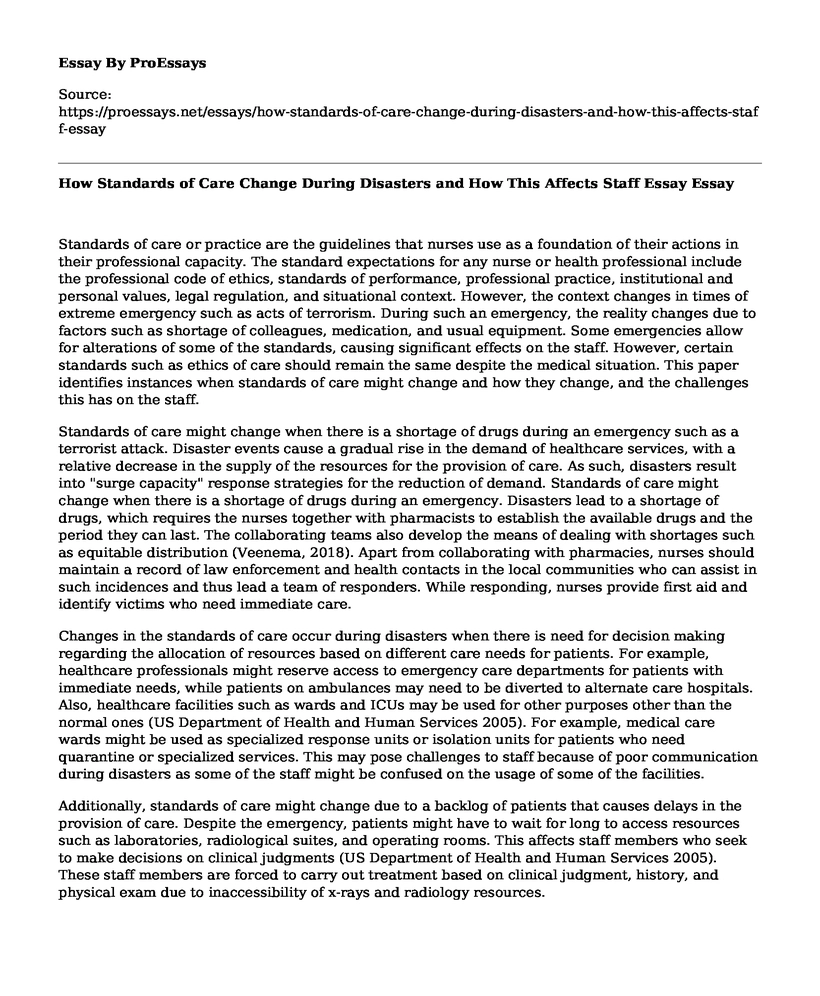Standards of care or practice are the guidelines that nurses use as a foundation of their actions in their professional capacity. The standard expectations for any nurse or health professional include the professional code of ethics, standards of performance, professional practice, institutional and personal values, legal regulation, and situational context. However, the context changes in times of extreme emergency such as acts of terrorism. During such an emergency, the reality changes due to factors such as shortage of colleagues, medication, and usual equipment. Some emergencies allow for alterations of some of the standards, causing significant effects on the staff. However, certain standards such as ethics of care should remain the same despite the medical situation. This paper identifies instances when standards of care might change and how they change, and the challenges this has on the staff.
Standards of care might change when there is a shortage of drugs during an emergency such as a terrorist attack. Disaster events cause a gradual rise in the demand of healthcare services, with a relative decrease in the supply of the resources for the provision of care. As such, disasters result into "surge capacity" response strategies for the reduction of demand. Standards of care might change when there is a shortage of drugs during an emergency. Disasters lead to a shortage of drugs, which requires the nurses together with pharmacists to establish the available drugs and the period they can last. The collaborating teams also develop the means of dealing with shortages such as equitable distribution (Veenema, 2018). Apart from collaborating with pharmacies, nurses should maintain a record of law enforcement and health contacts in the local communities who can assist in such incidences and thus lead a team of responders. While responding, nurses provide first aid and identify victims who need immediate care.
Changes in the standards of care occur during disasters when there is need for decision making regarding the allocation of resources based on different care needs for patients. For example, healthcare professionals might reserve access to emergency care departments for patients with immediate needs, while patients on ambulances may need to be diverted to alternate care hospitals. Also, healthcare facilities such as wards and ICUs may be used for other purposes other than the normal ones (US Department of Health and Human Services 2005). For example, medical care wards might be used as specialized response units or isolation units for patients who need quarantine or specialized services. This may pose challenges to staff because of poor communication during disasters as some of the staff might be confused on the usage of some of the facilities.
Additionally, standards of care might change due to a backlog of patients that causes delays in the provision of care. Despite the emergency, patients might have to wait for long to access resources such as laboratories, radiological suites, and operating rooms. This affects staff members who seek to make decisions on clinical judgments (US Department of Health and Human Services 2005). These staff members are forced to carry out treatment based on clinical judgment, history, and physical exam due to inaccessibility of x-rays and radiology resources.
Conclusion
Disasters present the healthcare system with heavy burdens and thus require the joint response and action of different healthcare professionals regardless of the setting. Inter-professional collaboration is one of the essential strategies in the provision of healthcare especially during times when there are shortages of medication. This strategy of professionals working together helps in improving patient experiences and increasing satisfaction, and also reduces costs.
References
Veenema, T. G. (Ed.). (2018). Disaster nursing and emergency preparedness. Springer Publishing Company.
US Department of Health and Human Services. (2005). Altered standards of care in mass casualty events.
Cite this page
How Standards of Care Change During Disasters and How This Affects Staff Essay. (2022, Nov 20). Retrieved from https://proessays.net/essays/how-standards-of-care-change-during-disasters-and-how-this-affects-staff-essay
If you are the original author of this essay and no longer wish to have it published on the ProEssays website, please click below to request its removal:
- Research Paper Example on Triage Systems in Emergency Departments
- Research Paper on Hodgkin Lymphoma and Non-hodgkin Lymphoma
- Drug Abuse in Athletes: The Need for Weed Essay
- US Must Reduce & Refuse Plastic Waste: Major Challenge Despite Interest Groups - Essay Sample
- Paper Example on 4 Types of Evidence in Ramsey Case: Physical, Doc., Expert, DNA
- Paper Example on Hospital-Acquired Pressure Ulcers: Causes & Risk Factors
- Design Control for Particulate-Phase Pollutants: Cyclones, Electrostatic Collection & Filtration







